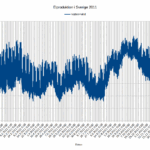Nike, Starbucks, Levi Strauss, Timberland m.m. har dragit igång en kampanj för införande av utsläppshandel i USA.
”Theoretically, it would reduce dangerous pollution over time while encouraging the development of clean energy.”
Teoretiskt? Ja, kanske. Hur det går till i praktiken ser vi med fördel i Europa.
Redan förra året lanserade Nike BICEP – Business for Innovative Climate & Energy Policy.
“Our government affairs director was hearing from his colleagues in Washington that they weren’t hearing enough from business and they particularly weren’t hearing from the kind of business Nike represented,” said Sarah Severn, who heads Nike’s sustainability efforts.
Hur går det för Nike då?
“The company has achieved all its previous greenhouse gas reduction goals since 1997, decreasing its total carbon footprint by 80 percent”, säger Nike själva.
Fast sanningen är kanske något annorlunda. Enligt en artikel i Business Week är det bara en mycket liten del av Nike som omfattades av klimatarbetet.
Nike announced in 2001 that it would cut by 13% its carbon emissions from a small subset of its operations: Nike-owned facilities and employee travel. Last year the company declared that it had beaten its goal, registering an 18% decline. The WWF, which has advised Nike, gave the company its top 2007 climate prize at the Paris press event.
Nike’s climate claims deserve closer scrutiny, however. In making the 18% reduction claim, it excluded extensive outside manufacturing activities as well as the shipment of products around the globe. Emissions from company-owned buildings and employee travel actually rose, too.
Nike, based in Beaverton, Ore., says it offset some of its pollution by means of an Oregon Energy Dept. tax-credit program in which companies can pay schools and other public institutions to take energy-saving steps. Companies get this money back, plus about 30% extra, in tax breaks spread over five years.
Nike subtracted from its emissions the pollution the schools cut, a total of 89,933 tons over four years. The company says it deserves the offsets because the earnings from the program of a little more than 5% a year were less than what it could have made from other investments.
Vem sade att matematik är en exakt vetenskap?








Sanningen är troligen att detta är en ”smoke screen”så att man inte närmare eller oftare synar deras leverantörer i Asien för barnarbete, arbetsmiljö mm. Moderna avlatsbrev!
Företag som inte alls är i energisektorn och kommer med såna här idéer har jag väldigt svårt för. Det vore skillnad om dom startade kampanjer för att bättra på folkhälsan, ta på sig Nike-skorna och ta en rejäl omväg runt Starbucks t ex…
…men om man joggar eller idrottar i Nike-dojorna blir det väl mer CO2-utsläpp? Vi får nog klimatkompensera på gymmet eller köra med mask – som man ju gör vid syreintagstestet – och ta utsläppsgasen till värmepannan eller så. Har IOC detta klart för sig? I vilket fall bör Stockholm/Sverige inte kandidera för fler sportevenemang. Det vore ju klimatovänligt. Kör dem på södra halvklotet så får vi se dem på vår soleldrivna TV – nej det går ju inte på natten – ja då blir det vindkraft eller handkraft eller så får sova gott.
Ja, jag ska verka för att vi ska införa totalt träningsstopp på min arbetsplats. Onödiga CO2-utsläpp. 🙂
De som tillverkar saker i fabriker kan nog tjäna GROVA pengar på utsläppsrättshandel.
UD/RK hade ett exempel i artikeln ”A factory that makes 30 TIMES MORE MONEY by selling “carbon credits” to fight global warming than it makes by selling it’s products.”:
http://www.uddebatt.wordpress.com/2008/07/23/a-factory-that-makes-30-times-more-money-by-selling-“carbon-credits”-to-fight-global-warming-than-it-makes-by-selling-it’s-products/
Det är såklart ingen slump att Nike tar den position de tar.
För samhället i stort skulle dock utsläppsrättshandel vara katastrofalt. Det ”fungerade” hjälpligt i Europa så länge gamla öst sålde sina gigantiska överskott till väst (transferering till mestadels Ryssland) men har väl kraschat sen, eftersom en sån låtsas-”valuta” saknar legitimitet. Kostnaderna torde bli stora både för samhälle och enskilda.